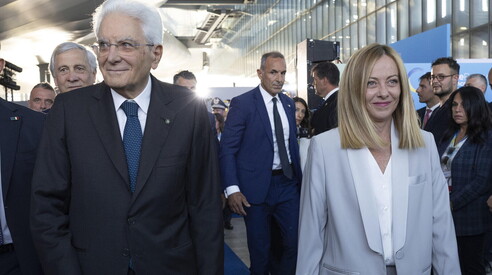"Tone it down," Mattarella and the clash between Meloni and the judiciary. The Tanzi precedent for Bartolozzi's shield is in play.


The case
Justice and the Quirinal front: the non-aggression pact on reform, the mess of the Almasri case, and the coldness with Justice Minister Carlo Nordio.
On the same topic:
There is "concern" among those silently following the increasingly bitter debate between the government and the judiciary. And therefore, the "hope that the tone will be lowered on both sides." But President Sergio Mattarella also recognizes that this climate could continue to fuel one another. Indeed, yesterday morning, Prime Minister Giorgia Meloni, before leaving for Greece, as reported by Il Foglio, dismissed the AVS initiative to file a complaint with the International Criminal Court over Gaza as "an attempt to get rid of their adversaries through judicial means." Elly Schlein's reaction: "Subversive insinuations." This is the climate. In reality, there is a non-aggression pact between the Quirinale and Palazzo Chigi on the constitutional reform of the justice system: the head of state, who is also the head of the CSM, has never expressed an opinion on the matter.
And even the prime minister let slip at the press conference at the beginning of the year that the Quirinale wasn't opposed to the separation of careers. This certainly doesn't mean that Meloni's tone in recent days—"the judiciary is planning to stop me"—hasn't scratched the windows of the Quirinale. Such incidents, when contextualized with past clashes between the Cavaliere and the judiciary, certainly don't surprise those who are well-versed in the Quirinale.
Meloni and Mattarella spoke on the phone three days ago regarding the Sports Decree: a tug-of-war lost by the government, forced to remove the amendments unwelcome by the Quirinale. The president will be moving to the mountains for a family vacation in the next few hours. No public statements on this thorny issue are currently planned.
The issue of the release and repatriation of Libyan torturer Almasri is even more subtle. "A mess." The Quirinale had no say in the matter, other than being informed after decisions were made. But this affair sheds light on another detail: the frosty relationship between Sergio Mattarella and Minister Carlo Nordio. A rapport that hasn't developed over nearly three years, marked by various tensions: from the misunderstandings with CSM Vice President Fabio Pinelli, now resolved, to the management of the prison emergency. And then there are discordant vocabularies and ways of speaking, worlds that don't communicate. And liaison officers who don't work. This is the case of Giusi Bartolozzi, a central figure at the Ministry of Justice, now on the rise and now in the lurch (though she hasn't yet been investigated) in the Almasri case. A cabinet chief with such special, almost legendary powers that Nordio had to reiterate yesterday, in an unusual statement, that "ministerial decisions are mine."
There's a risk that Bartolozzi could end up in the proceedings, as is the government's attempt to shield her if an investigation were to be launched, by requesting that the House's Authorization Committee also rule on her, and then ultimately the House itself. Center-right legislative experts have uncovered a curious precedent. It dates back to 2006, when the Tribunal of Ministers requested authorization to proceed against then-Minister of Agriculture Gianni Alemanno of the National Alliance (AN), along with former Parmalat owner Calisto Tanzi and a Collecchio company executive Romano Bernardoni, for illegal political party financing. The latter two, unlike Alemanno, were not members of parliament, nor members of the government, nor did they hold public positions. They were just ordinary citizens. The Ministers' Tribunal requested a trial for Alemanno (and the other two), accused of receiving €85,000 through advertising space paid for by a company owned by Tanzi in the AN-affiliated magazine "Area" in exchange for the ministry's interest in Parmalat's "Latte fresco blu" product, which was blocked by Bologna judges after Granarolo appealed. In the end, Alemanno waived his immunity, and so did Tanzi and Bernardoni. The trial came to nothing, but this precedent is now being recalled with a certain emphasis within the center-right because it could prove useful in the event of Bartolozzi's legal involvement. These are thoughts that may or may not have been on the mind of the prime minister since yesterday, while she was on vacation in Greece with family and friends, including Undersecretary Marcello Gemmato.
More on these topics:
ilmanifesto





